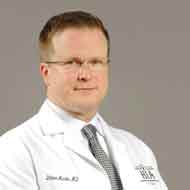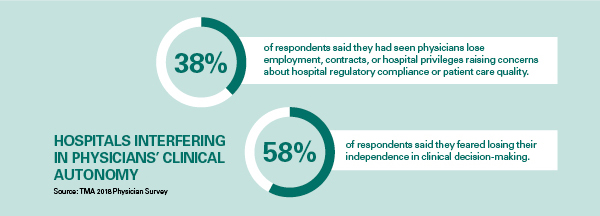The Last Line of Defense
 Physicians are the last line of defense between a patient and a corporation’s bottom line, says Austin hospitalist Dieter Martin, MD.
Physicians are the last line of defense between a patient and a corporation’s bottom line, says Austin hospitalist Dieter Martin, MD.
Hospitalists are skilled in treating the numerous non-emergency circumstances they encounter while treating inpatients in a hospital. Emergency medicine physicians, meanwhile, are trained specifically to handle trauma and the rapid-fire assessment and treatment necessitated by emergencies. They aren’t interchangeable.
“Memorizing the rules to basketball doesn’t make me LeBron James,” Dr. Martin said. “I can play basketball, but not like he does.”
Compared to hospitalists, emergency physicians are like LeBron on the free agent market: expensive. And that cost differential, a lawsuit filed by Dr. Martin’s group alleges, is why the company that contracts for both specialties’ services mandated that hospitalists cover emergency room crises like cardiac arrest and mass casualties on overnight shifts.
These allegations have not been proven in court. But this kind of conduct is what doctors mean when they talk about the corporate practice of medicine: the usurpation by a nonphysician of a physician’s diagnostic, treatment, prescribing, and referral authority and responsibility. It’s the practice of medicine by corporations. Although illegal in Texas, it still happens frequently.
Consider the impact when administrators, rather than physicians, make critical medical decisions. Micromanagement of length-of-stay data, not a clinical assessment of a patient’s recovery, determines when a patient should be discharged from a hospital — even if he or she isn’t ready to go home yet, Dr. Martin said.
Hospitals are paid for patient stays based on diagnostic codes determined by physicians. But “it is not uncommon for hospitals to tack on additional costs based on lab results, like if labs indicate something like malnutrition,” explained Dr. Martin. “That’s not why the patient came to the hospital, and [it] will be coincidentally resolved during the regular course of treatment, but hospitals bill for it, which ultimately costs the patient more.”
Or imagine the relief you feel when your grandmother is finally ready to be discharged and her physician says she can continue to convalesce at home. Not so fast, says the hospital, insisting instead that she be referred to a rehab facility of the hospital’s choosing — and possibly ownership.
“It’s not really an arm’s length relationship,” says Dr. Martin. “It’s more like hands around a doctor’s neck.”
The more hospital-dependent medical specialists are, the more leveraged they are because the hospital essentially has a monopoly on their workplace. Emergency room physicians and anesthesiologists are most frequently caught in this cross-fire. Physicians, and their patients, have little opportunity to push back against hospital dictates.
When physicians do object, and contracts are threatened, they have few options: acquiesce or find themselves out of work. In a city like Austin, with only two hospital systems, finding other work can be challenging. Forcing physicians to another state or town, or into early retirement, only exacerbates our ongoing physician shortage.
When physicians talk about “clinical autonomy,” they mean white coats, not grey suits, should make patient-care decisions. Physicians are ethically and morally bound to put their patients first. Corporations have other responsibilities.
The sanctity of the patient-physician relationship is absolute. Patients trust their physicians to do what is best for their individual circumstances; physicians know that each patient is special and unique and requires their undivided attention. Everyone knows the physician’s credo: Responsibility to the patient is paramount. And despite the pervasiveness and ambiguity of endless regulations, day in and day out, physicians live and honor that rule. But the corporations that manage the business end of health care exist to make money. That unflinching focus on the bottom line — and persecution of those who report unethical incursions — has the potential to significantly and adversely impact patient care. TMA has several recommendations to reinforce our state’s ban on the corporate practice of medicine, or infringement upon the physician’s clinical judgment and paramount responsibility to the patient.
Protect Employed Physicians’ Clinical Autonomy
Texas’ ban on the corporate practice of medicine prohibits the employment of a physician by non-physicians in most circumstances. State law does, however, allow physicians to be employed by nonprofit health organizations “incorporated and directed by physicians licensed by the Texas Medical Board (TMB).” The medical board is also tasked with approving and certifying all nonprofit health organizations. An April 2017 TMB report listed 550 active organizations, the largest of which are closely aligned with big hospital systems and employ several thousand physicians. As these nonprofit health organizations multiply and grow, so do their opportunities to control physicians’ clinical decisions.
TMA recommends that the Texas Legislature:
- Protect physicians’ independent medical judgment and clinical autonomy when lay control can interfere with best practice.
- Ensure that transparent due process provisions are included in all contracts, and that physicians employed by lay owned or run entities have a fair discipline or termination “for cause” process.
- Prohibit retaliation against employed physicians for reporting quality of care concerns or advocating for patient safety and the quality of medical or hospital care.
- Establish at TMB a more robust process for receiving and investigating complaints against nonprofit health organizations.
- Prohibit hospitals from requiring or incentivizing employed physicians to make referrals to hospital-affiliated entities and professionals as a condition of employment.
- Pass no legislation that allows the government or corporate entities to dictate care or that prevents physicians from exercising their moral or ethical conscience or from providing medically appropriate care.

Texas Medical Board Sunset
Despite a complete Sunset review in 2016 and little disagreement over recommendations to improve the TMB, renewal of the agency and the Medical Practice Act became collateral damage in the battles between the Texas Senate and House of Representatives that marked the end of the 2017 regular legislative session. When lawmakers revisited TMB Sunset in the July-August special session, they decided to renew the agency for just two years and made no changes to TMB operations or the Medical Practice Act. TMB Sunset is back on the agenda for the 2019 legislature.
TMA recommends that the Texas Legislature:
- Renew the TMB and the Medical Practice Act for a full 12-year Sunset cycle.
- Ensure fair TMB disciplinary and appeals processes.
- Provide the overworked agency with more resources for licensing and oversight/enforcement.
Value Patient Autonomy
Perhaps no decision we make is more personal, difficult, or profound as choosing how we wish to spend our final days. Physicians encourage all Texans to think this through carefully — and discuss their decisions with family and loved ones — long before they enter a hospital or nursing home with a terminal illness. Texas physicians abide by the principle, “First, do no harm.” For this reason, TMA supports the Texas Advance Directives Act as signed into law by then-Gov. George W. Bush. Its aim is to allow patients to make their care preferences known before they need care, and to protect patients from unnecessary discomfort, pain, and suffering due to excessive medical intervention in the dying process.
TMA recommends that the Texas Legislature:
- Support patients’ right to make their own end-of-life care decisions and prohibit them from being overridden by a surrogate.
- Oppose attempts to legalize physician-assisted suicide.
- Protect physician moral conscience and continue to shield from liability physicians who seek to resolve end-of-life disputes via a medical ethics committee.
- Oppose changes to the medical power of attorney form that would permit the use of co-agents.